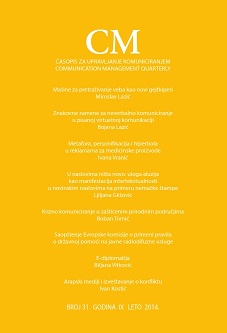Mašine za pretraživanje veba kao novi gejtkiperi
Search Engines as New Gatekeepers
Author(s): Miroslav LazićSubject(s): Media studies, Social development, Social Informatics, ICT Information and Communications Technologies
Published by: Fakultet političkih nauka Univerziteta u Beogradu
Keywords: Google; internet; Web; search engines; media gatekeepers; personalization of the Web content;
Summary/Abstract: We are living in the time of digital transition which is characterized by transformation of vast quantities of information from analogue into digital forms. One of the most distinctive consequences of this continual process is the phenomenon of information overload, which is further leading towards various different types of informational challenges. The other consequence is represented by transition of culture in its broadest sense towards online sphere, more particularly towards Web as the most know form of the Internet. Faced with unimaginable quantity of information web`s users are inclined to use search engines or social networking web sites rather than traditional public entities` services – like libraries or “traditional” media which are using the same or similar technologies, in order to overcome the problem of finding reliable information on the web. Sudden and accelerated rise of companies based on web searching, and especially positioning one of them as dominant and undisputed leader on the web`s market (Google), puts to the test prevailing ideological pattern about the Web as common public communication resource. Further consideration of search engines` means of working implies more than just technological aspects of their perfect algorithms. Stakes are much higher than that. Therefore, thorough analysis of search engines, their dominant role on the Web and their incredible influence on everyday life of the Web`s billions of users, are initiated within popular-journalistic as well as academic discourse of various provenance. This essay aims at arousing interest of the public on issues that go beyond local and national frameworks. Further development of these and questions alike is of essential importance, because it will shape the Web in the future, and therefore it will have implications on the Web`s users in our country as well.
Journal: CM Komunikacija i mediji
- Issue Year: 9/2014
- Issue No: 31
- Page Range: 5-22
- Page Count: 18
- Language: Serbian

